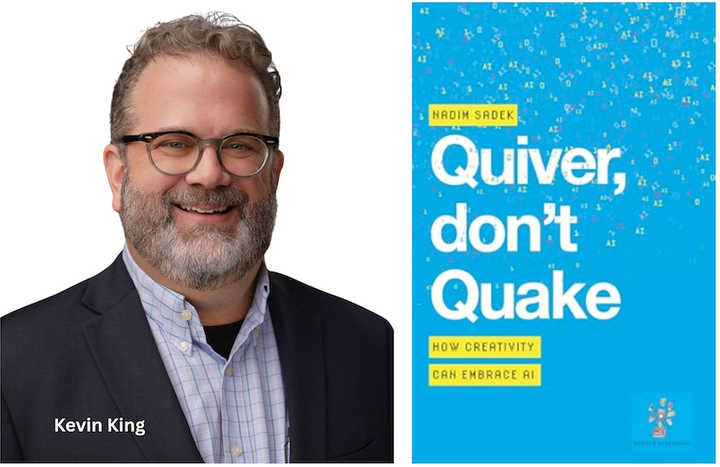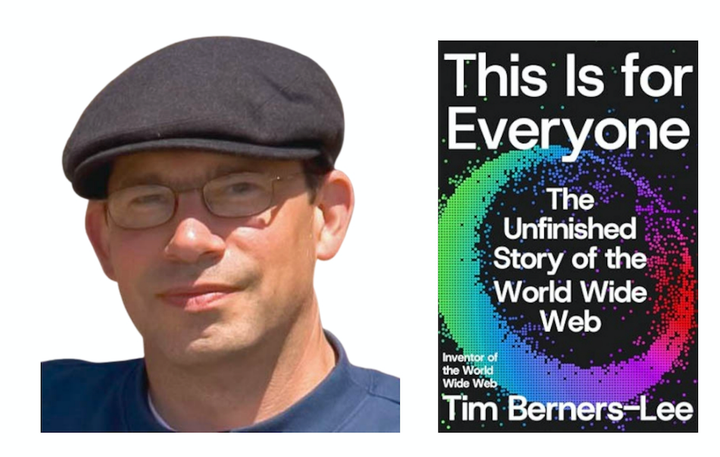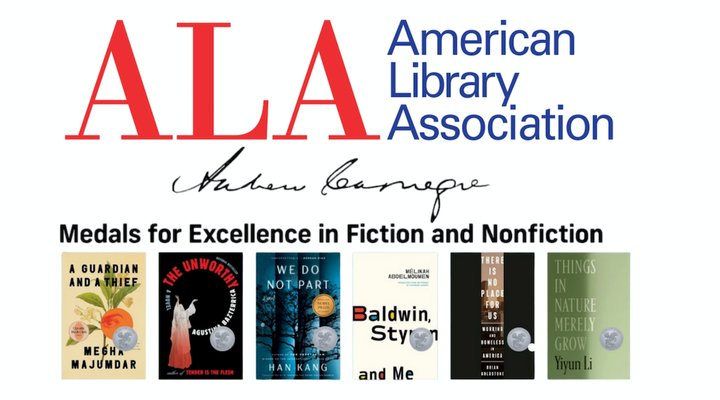For Our Book Launch, We Ditched the Social Media. We Chose Public Libraries Instead.
'Heartland Masala' author Auyon Mukharji reflects on the role public libraries played in a fun and successful fall book tour.

The September release of Heartland Masala, a cookbook I co-authored, was atypical. Most cookbook release tours consist of a handful of regional events. Ours spanned more than 40 talks, demos, library events, and dinners nationwide. Most authors don’t voluntarily spend an entire fall trundling across the country with an aging parent. My co-author was my dear mother, so trundle we did.
Perhaps the most unconventional bit of our release, though, was what we chose not to do: maintain a social media presence. (My day job as a member of the band Darlingside has taught me that using apps like Instagram with any regularity makes me more anxious, more insecure, and more scatterbrained.) Since social media is the keystone of almost every contemporary publicity campaign, I had to come up with ways to make up the deficit. I wrote a regular newsletter and planned an ambitious tour, both of which helped to build some buzz. What I did not anticipate, however, was how foundational libraries would prove to our release.
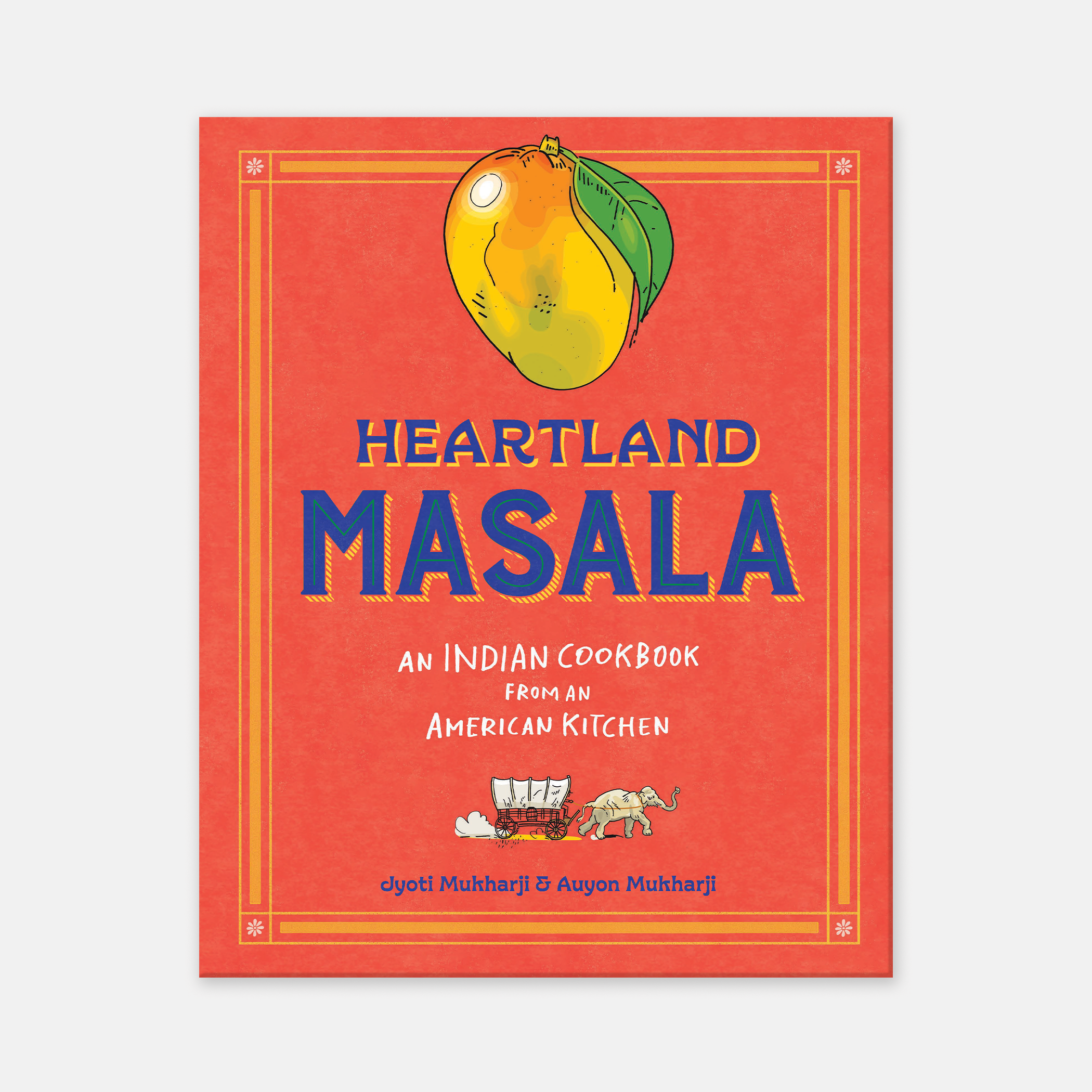
The first conference that my mom and I participated in together was the American Library Association Annual Conference in Philadelphia this past June. That conference, in conjunction with some excellent networking by our publicist, was where we laid the groundwork for the library book talks that came to define our tour.
Two events in particular bear mentioning. The first was a book talk at the Cypress Library in California, where the first 50 attendees received a free copy of the book, compliments of a local library-oriented nonprofit. The second was a sold-out book talk at the Toledo Lucas County Library in Ohio, where a catering company—staffed by decidedly non-Indian Ohioans—absolutely nailed our cookbook’s butter chicken and Indian lemonade recipes. My mom just about fell out of her chair when she tasted them. (Some context for non-caterers: a 1x cookbook recipe that comes out well is a testament to the cookbook; a cookbook recipe scaled up for a crowd of a hundred that comes out well is a testament to the cooks.)
In retrospect, the importance of libraries to our book tour should not have come as much of a surprise, given the starring roles they played in our book’s inspiration and construction. Long before my mom started teaching the cooking classes that inspired Heartland Masala, she was a young immigrant mother in Kansas City teaching herself how to cook. She learned a lot via correspondence courses with her mother and mother-in-law, but she also owes a debt of gratitude to her children’s school library. While in elementary school, my baby brother Aroop not only checked out books for himself, but also cookbooks for our mom. My mother claims she can still make a traditional Linzertorte while blindfolded, due to Aroop’s affinity for—and serial borrowing of—a particular Austrian cookbook.
Decades later, when I was writing and editing our cookbook manuscript while living out of my Honda CRV in the bleary wake of the pandemic, the libraries of New England served as my writing (and rewriting) rooms. While on tour, libraries were our first choice whenever my mom and I needed a space to unwind and just sit. We even got the chance to offer some institutional support: at a fundraiser for Indiana’s Carmel Clay Public Library, we spoke alongside New York Times bestselling authors to a crowd of several hundred, the largest audience my mother and I have yet addressed.
Had you asked me, before our book tour started, what might counterbalance my refusal to engage with social media over the course of the tour, “people who don’t know us discovering us at library events” would not have been top of mind. But here on the far side of the tour, I can attest that our library events were the single most consequential element of our book tour, publicity-wise. And while libraries and social media are admittedly not mutually exclusive phenomena, Instagram might not have a more apt physical antithesis than your local library: a real space filled with real people who are not trying to sell you anything (barring, of course, the odd mother-son duo hawking an illustrated Indian cookbook).
Did my avoidance of social media cost us opportunities, connections, and sales? Almost certainly. But that same abstention also allowed me to plug more deeply into our life on the road: interacting with readers and cooks, hanging out with my mom, and roaming around cities and libraries. Even if it was a questionable business decision, it was an excellent life choice. If I could do our tour all over again, I wouldn’t change a thing—except, perhaps, for visiting more libraries.
Auyon Mukharji is a musician, author, and culinary historian. He writes a newsletter at Heartland Masala HQ.
These Brussels Sprouts from 'Heartland Masala' Are Absolutely Craveworthy
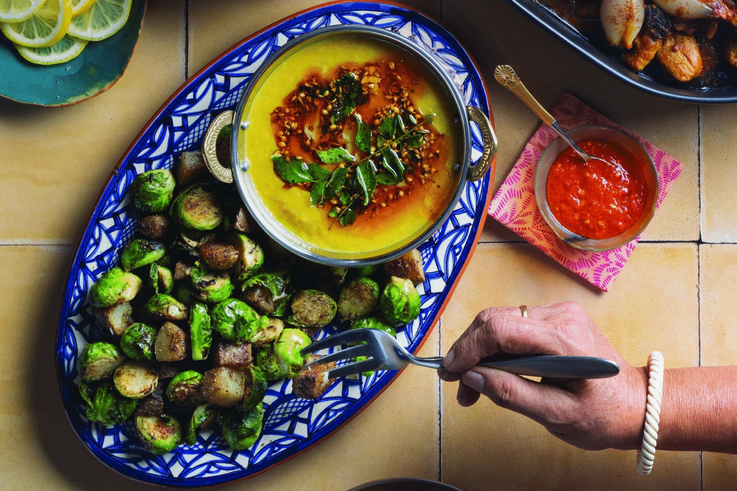
Editor's Note: Every year around this time my family begins scouring bookshelves and the web for new flavors and dishes to add to our Thanksgiving table. So this year, I asked Heartland Masala co-author Auyon Mukharji for a recommendation. And his choice—Masala Brussels Sprouts—is a winner. Not only is this dish perfectly at home on any Thanksgiving table, you'll want to work this dish into you regular rotation. Listen, I know. If you had told me that there's a Brussels sprouts recipe out there so good that I'd be craving it, I wouldn't have believed you either. But this one is. Give it a shot. Enjoy, and happy Thanksgiving!
Masala Brussels Sprouts
Serves four. Cook time 45 minutes.
Jyoti Mukharji: Brussels sprouts were unfamiliar to me until I moved to the United States in the 1970s. When I finally got my hands on some, I had a lot of fun experimenting with different Indian-style preparations. This version emerged as one of my favorites, and it has since become a sought-after recipe among my students as well. The sour tang of the dried mango and the creaminess of the potatoes complement the nutty, spice-darkened sprouts marvelously. No need to peel the potatoes for this one—as with all of our recipes, potatoes should remain unpeeled unless indicated otherwise.
⅓ cup (80 ml) canola oil
1 tablespoon cumin seeds
1 large russet potato
(11¼ ounces // 320 g), cubed into 1-inch (2.5-cm) chunks (see above)
2 tablespoons ground coriander
1 tablespoon amchoor (ground dried mango)
1 teaspoon ground cumin
1 teaspoon salt, plus more to taste
¼ teaspoon ground cayenne (optional)
1 pound (455 g) Brussels sprouts, trimmed and quartered lengthwise
(if some or all of your sprouts are shorter than 1½ inches // 4 cm, halve
them lengthwise rather than quartering them)
- Heat the oil in a large, lidded (but uncovered for now), nonstick pan over medium-high heat. Once the oil starts to shimmer, add the cumin seeds and
sizzle, giving the pan a shake or two, until they darken a couple of shades and become fragrant, about 30 seconds. - Add the potato and cook, stirring frequently, until the potato is lightly fried all over and starting to brown on all edges, 5 to 7 minutes.
- Reduce the heat to low and add the coriander, amchoor, ground cumin, salt, and cayenne (if using). Try to sprinkle the spices evenly over the whole pan to avoid clumping. Stir well to combine, and then immediately add the Brussels sprouts. (The ground spices should cook in the hot oil for a second or two
before the sprouts join the pan, but they will scorch if you wait too long, so move quickly.) - Stir thoroughly again. Increase the heat to medium, cover, and cook, stirring every few minutes to make sure every vegetable piece is eventually coated with ground spices. Keep the pan tightly covered between stirrings to preserve the steam. The dish is done when the potato pieces are totally soft but still keep their shape, 10 to 15 minutes (if the potato takes a bit longer than that to soften, reduce the heat to low and stir often for any additional time to ensure the spices don’t burn). The sprouts should be cooked through, but can have a bit of bite, and the spices should darken a few shades but not blacken.
5. Taste for salt and serve hot.
Reprinted with permission from Heartland Masala by Jyoti Mukharji and Auyon Mukharji (The Collective Book Studio, September 2025).

